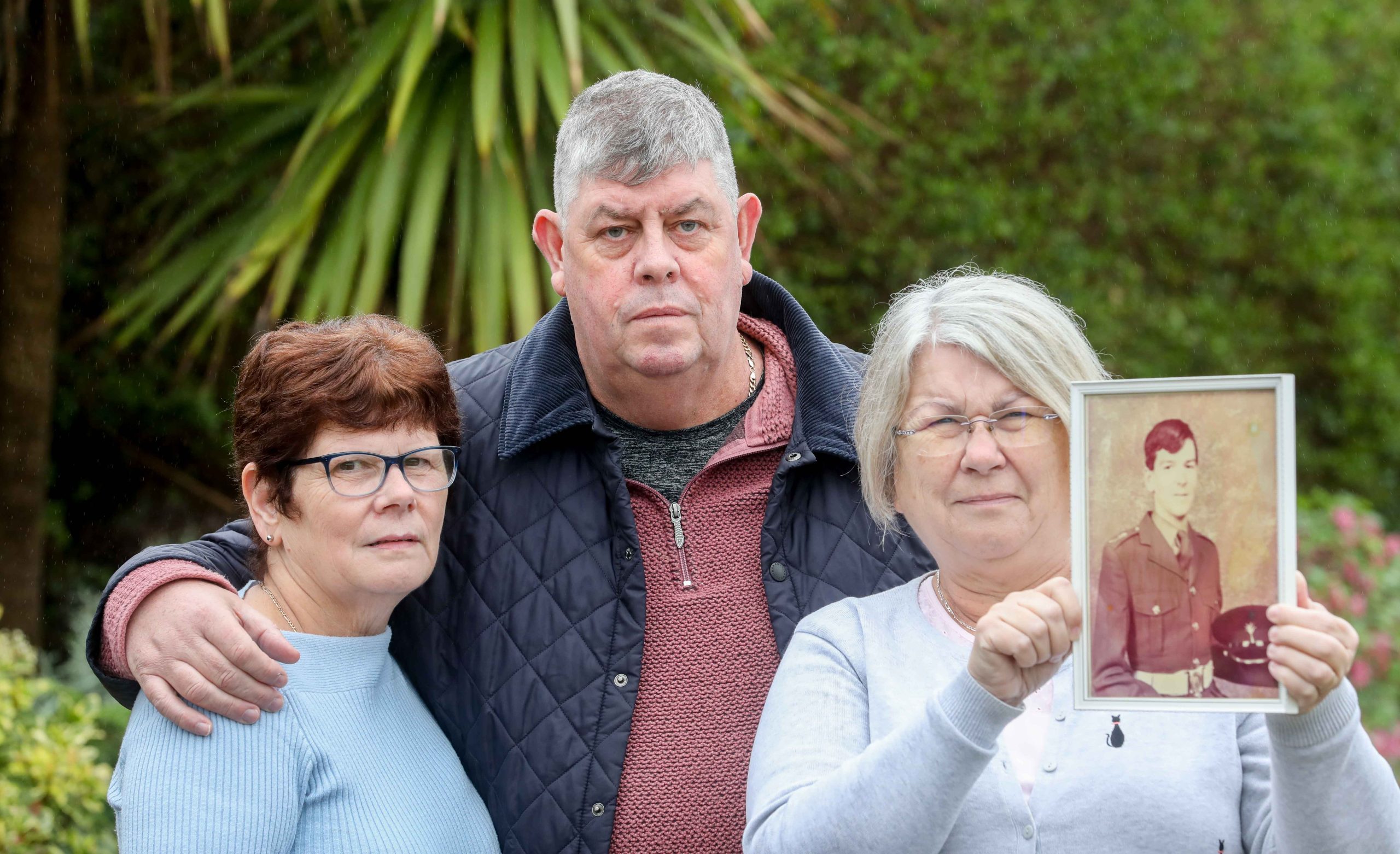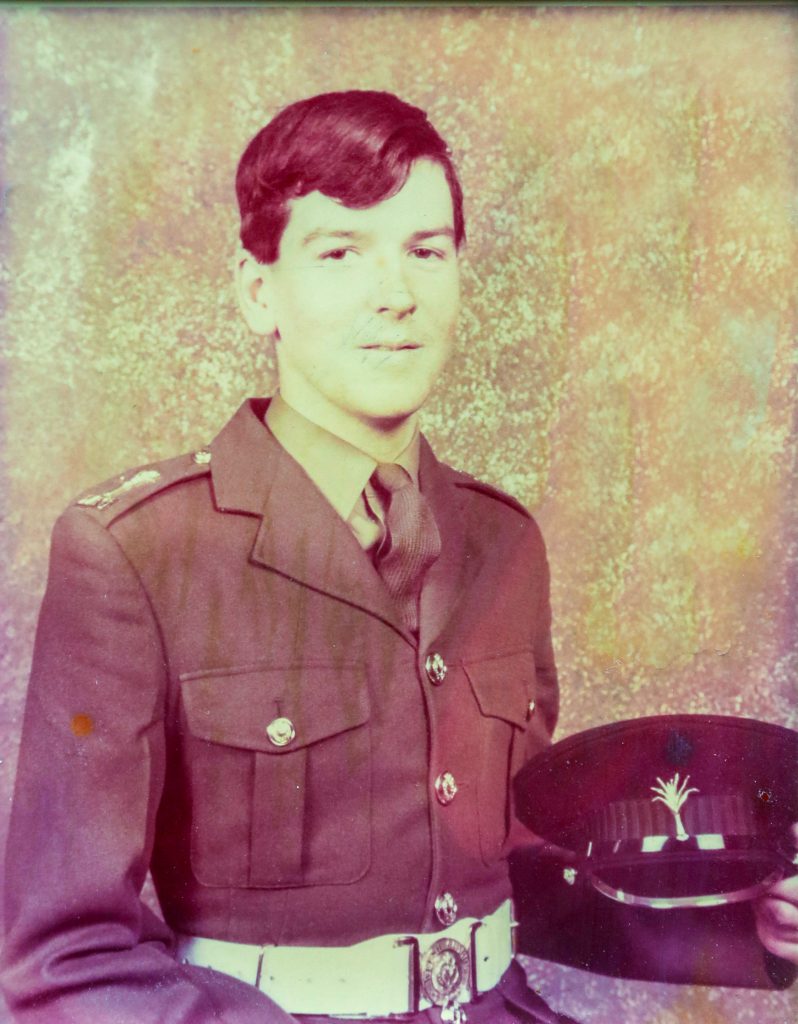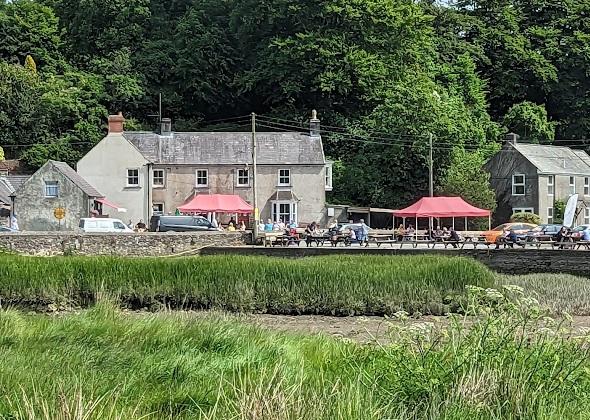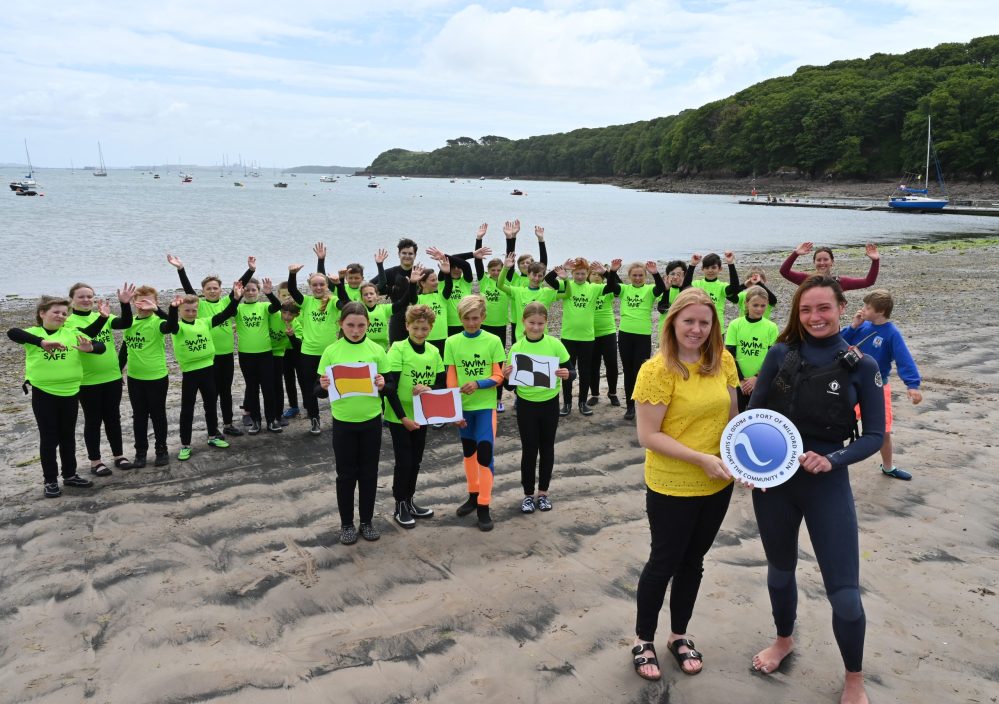Community
Falklands War: We were all just kids, innocents to the slaughter

A FALKLANDS WAR veteran and the two sisters of one of his lost comrades are campaigning to win justice for 32 Welsh Guards killed in the bombing of British ship RFA Sir Galahad.
Not a day goes by without Rhyl businessman Les Peake re-living the horrific firestorm which saw 48 of his comrades killed on the morning of June 8, 1982, including the Welsh Guards.
Among them was his pal Peter Edwards, aged just 19, from Llandyrnog, near Denbigh, described by his sisters Mandy Perkins and Barbara Royles as having been ‘full of life’.
Les, Mandy and Barbara are among Falklands veterans and their families who are seeking answers about the Sir Galahad disaster which shell-shocked the nation.
They are incredulous that red tape means documents revealing the full facts about the bombing are sealed for another four decades until 2065.
Speaking ahead of a landmark reunion event in Cardiff on March 23, they called on UK Government ministers to change the rules and immediately unveil the official records to reveal how the Sir Galahad became an open target for Argentinian bombers.
Pete was the son of proud parents Evelyn and Gordon Edwards, and had only been a soldier for around a year when the Falklands War broke out.
Mandy said: “Pete joined the Welsh Guards because there were no jobs around at that time. He loved his training and quickly made lots of friends in the army.”

But in the spring of 1982 he and fellow Welsh Guards, including the now famous burns charity campaigner Simon Weston, were posted to the South Atlantic after Argentinian forces invaded self-governing British overseas territory, the Falkland Islands.
As a specially trained ‘Spearhead Battalion’ they were tasked with ramping up the Royal Navy mission to liberate the Falkland Islands.
But as they arrived confusion reigned even before they managed to get ashore.
They were inexplicably sent to a different nautical location than originally planned. Vital landing craft failed to show up, and scores of soldiers were unexpectedly put onto the civilian supply ship RFA Sir Galahad where they were told to wait for a fleet of smaller boats to bring them to shore.
But as daylight dawned, having no surface to air missile defences on board Sir Galahad, they became sitting ducks within the sightline of Argentine jets.
The defenceless ship, full of munitions and fuel, suffered three direct hits from Argentine bombs. It became a raging inferno from which there was no escape.
It was the highest loss of British troops of any incident in the war and the biggest single day British military disaster since World War II.
Memories of that hellfire, haunting visions of his comrades on fire, and their desperate screams for help, will never leave Les or his fellow survivors.
Les was aged 18, and most of the young Guards who lost their lives were also in their late teens.
He said: “We were all just kids, innocents to the slaughter. I was 18, my cousin was there too, and Pete was 19, we were teenagers, good pals, young men on the verge of adulthood.”
Back at home, for Mandy, Barbara and their families, the day news of the attack reached them is forever etched in their minds.
They say the huge loss of life is hard enough to bear, but the distress of losing loved ones has been compounded by controversy which has surrounded the Sir Galahad disaster over the last four decades.
Veterans and bereaved families are angry and distraught that some media reports, government and military officials have laid the blame for the disaster at the door of the Welsh Guards, accusing them of incompetence and being unprepared.
Les said: “We’ve been made scapegoats. It’s a travesty of justice to let us be blamed for events clearly out of our control.”
Although an official inquiry was held shortly after the war ended, its findings have never been fully released. Only highly redacted versions have been made available and many survivors’ questions remain unanswered.
They are calling for the names of key decision-makers to be unveiled along with an explanation as to why the battalion came to be placed in an exposed location on an undefended supply ship in the first place.
Mandy and Barbara are furious, feeling that for too long their brother’s name and the reputation of the Welsh Guards have been ‘unfairly slurred’.
They want the findings of the Board of Inquiry report into the incident to be unsealed in full. They say it is incomprehensible that the report is currently not due to be opened for public viewing until 2065.
The hope is that the government will finally recognise the strength of feeling demonstrated by those attending the reunion of RFA Sir Galahad survivors, bereaved families and supporters at the Mercure Hotel, Cardiff, on March 23.
It is the first ever reunion of its kind involving surviving veterans, with guests and speakers including prominent figures who have joined the fight for justice like General Sir Michael Rose, commander of the SAS; Master of the RFA Sir Galahad, Philip Roberts; Welsh Senedd member Jenny Rathbone and south Wales MPs, Jessica Morden and Stephen Doughty.
Reunion organiser Kevin Edwards, himself a Sir Galahad survivor, said decisions will be on the day about the proposed next steps.
He said: “A recently redacted copy of the Board of Inquiry report clearly shows that the Welsh Guards and its officers were completely exonerated of any blame in 1982, yet many official voices and authors of media publications still wrongly state differently and smear our regiment’s name.
“The bereaved and veterans have endured almost 42 years of blame, 42 years of defamation of character, capabilities and the names of our fallen dragged through the dirt. Enough is enough, we who remain will all be history by the year 2065.
“Our committee met with cross party MPs in Parliament of late, having produced evidence uncovered at the national archives at Kew. This resulted in Sir Ian Duncan Smith, Priti Patel and many MPs to suggest that there remain questions to be answered. They all fully support our campaign.”
The original 1980s inquiry was held behind closed doors shortly after the attack but its meagre published findings comprised merely a statement that concluded the loss of the ship and troops was down to the ‘ordinary chances of war’.
Survivors dispute this and cite a catalogue of errors made by senior commanders who they say needlessly left the Welsh Guards defenceless and vulnerable.
Their calls for the truth to come out have grown stronger following the publication of a book last year, ‘Too Thin for A Shroud’, by Crispin Black, a former Welsh Guards officer who survived the Sir Galahad and went on to become an intelligence adviser in the Cabinet Office. He will also be speaking at the reunion.
In the near-42 years which have passed Les has barely had a full night’s sleep. He has suffered his marriage break-up, two years of homelessness, rifts with his family and persistent nightmares.
These days he takes refuge in his work, describing himself as a workaholic, who tries to stave off nightmares by allowing himself only two or three hours sleep a night.
He said: “Sleep is my enemy now. The nightmares kick in and bring it all back, so I avoid sleep as much as I can. Even so there is never a day when I don’t think about what happened out there. I try to push it out of my mind.
“I know some survivors who turn to alcohol or drugs. For some the constant torment drove them to commit suicide.
“I have had rough times in the past, my moods became so bad that I grew apart from my family.
“I was homeless for two years and then I took to driving to earn a living, taking trucks all around Europe just to stay on the move, never letting my mind settle.
“More lately I’ve coped by diverting my attention away from the dark thoughts, I put my whole focus on work. I now run a successful transport company, with my two daughters. You could say I’ve learned to cope by becoming a workaholic.
“It’s really not good for my mental health to let my mind wander back to such dark visions. But it’s something that I feel I have to risk for Pete, all the others who died, their families, and for survivors like myself who still live with these memories every single day. We all deserve justice.
Community
Cresswell Quay conservation consultation launch backed

A PUBLIC consultation is to be held on potentially making one of south Pembrokeshire’s most scenic estuarial villages, home to a CAMRA award-winning pub, a conservation area.
At the July 24 meeting of Pembrokeshire Coast National Park, members backed a public consultation being launched for potentially designating Cresswell Quay as a Conservation Area.
Cresswell Quay, home to the Cresselly Arms, is “one of the most scenic villages within the National Park and is highly significant as a very early coal port, retaining several buildings of architectural importance,” a report for members stated.
There are some 500 conservation areas, defined as “areas of special architectural or historic interest, the character of which it is desirable to preserve or enhance” across Wales, 14 in the national park.
The report for Park members added: “The designation of a conservation area at Cresswell Quay would recognise the special architectural and historic interest of the village and would ensure that future development either preserves or enhances the character and appearance of the conservation area.
“The designation would introduce controls over the demolition of buildings which would require conservation area consent and affords greater protection of works to trees. Officers consider that part of the special interest of Cresswell Quay is the relationship between the village, the estuary and its wooded setting, which is unusual in a Pembrokeshire context.”
The consultation on the conservation status has been backed, rather than simply be designated in-house as Cresswell Quay is the home of the Buildings Conservation Officer; the consultation being launched “to avoid any potential conflict of interest or wider public misconception”.
It will be undertaken by Linda Jones of Babb Architects, Whitland and Emily Holder, Conservation Assistant, supported by members of the Strategic Policy team.
Initial engagement with key landowners and the three community councils of the area has already taken place, and a public drop-in event is expected to take place in early August.
Further information on the consultation will also promoted at events including the Pembrokeshire County Show and Martletwy Show.
At the national park meeting, member Cllr Simon Hancock expressed his surprise the ‘Quay was not already in a conservation area.
The eight-week consultation is expected to be launched on July 29, finishing on September 23.
Earlier this year the Cresselly Arms won the CAMRA (Campaign for Real Ale) pub of the year award for the whole of Wales.
The Cresselly Arms averaged 89 points out of a maximum 120 after surveys were conducted across the country by members of other branches.
Community
Public reminded to stay away from Ward’s Yard and Criterion Quay

THE PORT of Milford Haven is reminding members of the public to stay away from Ward’s Yard in Milford Haven and Criterion Quay (sometimes known as the offshore jetty) in Pembroke Dock due to concerns over public safety.
Despite significant security measures, people continue to access the sites illegally, ignoring and sometimes damaging the onsite signage and fences.
Niall Yeomans, Head of Health, Safety and Security at the Port of Milford Haven said: “Safety is our key priority. Members of the public are continuously putting themselves and members of our team at risk of serious harm by trespassing in these areas.”
“Both Ward’s Yard and Criterion Quay are unsafe for public access. They are isolated areas next to deep water and are susceptible to slips, trips and falls.”
Both sites are owned by the Port of Milford Haven and are private property. Anyone found onsite without consent is trespassing, and any criminal damage could result in prosecution.
Anyone who sees any suspicious activity at Ward’s Yard or Criterion Quay is asked to contact Dyfed Powys Police on 101 urgently.
Community
Port sponsors water safety programme for Pembrokeshire pupils

OVER 200 children from coastal schools in Pembrokeshire have learnt important water safety skills in a project sponsored by the Port of Milford Haven.
Dale-based water sports provider, Windswept CIC, has been running the Swim Safe programme for Year 5 and 6 pupils from St Francis Catholic Primary School, Milford Haven Community Primary School, Neyland Community School, Broad Haven Primary School and Cleddau Reach School over the past few months. Swim Safe was started by the RNLI and Swim England and consists of a teacher-led school session with materials and lesson plans provided, followed by a beach session covering a wide range of topics including what to do in an emergency situation, survival techniques and recognising risks associated with water.
Director of Windswept, Sarah Bagley, said “This is our second season conducting Swim Safe training to schools in Pembrokeshire, supported by the Port of Milford Haven. Swim Safe is such a great initiative and is so important for all young children to equip them with life saving skills prior to the summer holidays. We’d like to thank the Port of Milford Haven once again for supporting this great cause!”
Sara Richards, PR and Communications Executive at the Port of Milford Haven, attended a session with Cleddau Reach School from Llangwm and commented “Living near the sea means it’s vital that young people know what to do in an emergency and are aware of the risks associated with the water. We want everyone to enjoy the coastline as much as possible this summer armed with the safety tips that they will have learnt with Windswept.”
-

 Education5 days ago
Education5 days agoMilford Tesco worker achieves Oxford dream and lands top legal job
-

 Crime4 days ago
Crime4 days agoHaverfordwest man admits having nearly 1000 child and animal images
-

 Crime4 days ago
Crime4 days agoYouth set to appear in court over serious sexual offences
-

 Crime4 days ago
Crime4 days agoPolice investigating after man injured during altercation in cemetery
-

 Education4 days ago
Education4 days agoPupils delight in ice cream treat from Pembrokeshire’s number one van
-

 Crime4 days ago
Crime4 days agoTown centre ‘stinking of skunk’ as police strip cannabis farm
-

 Crime3 days ago
Crime3 days agoFag-butt police court summonses spark debate in Pembrokeshire
-

 News6 days ago
News6 days agoProposal to give firefighters a council tax discount to go to Cabinet




























